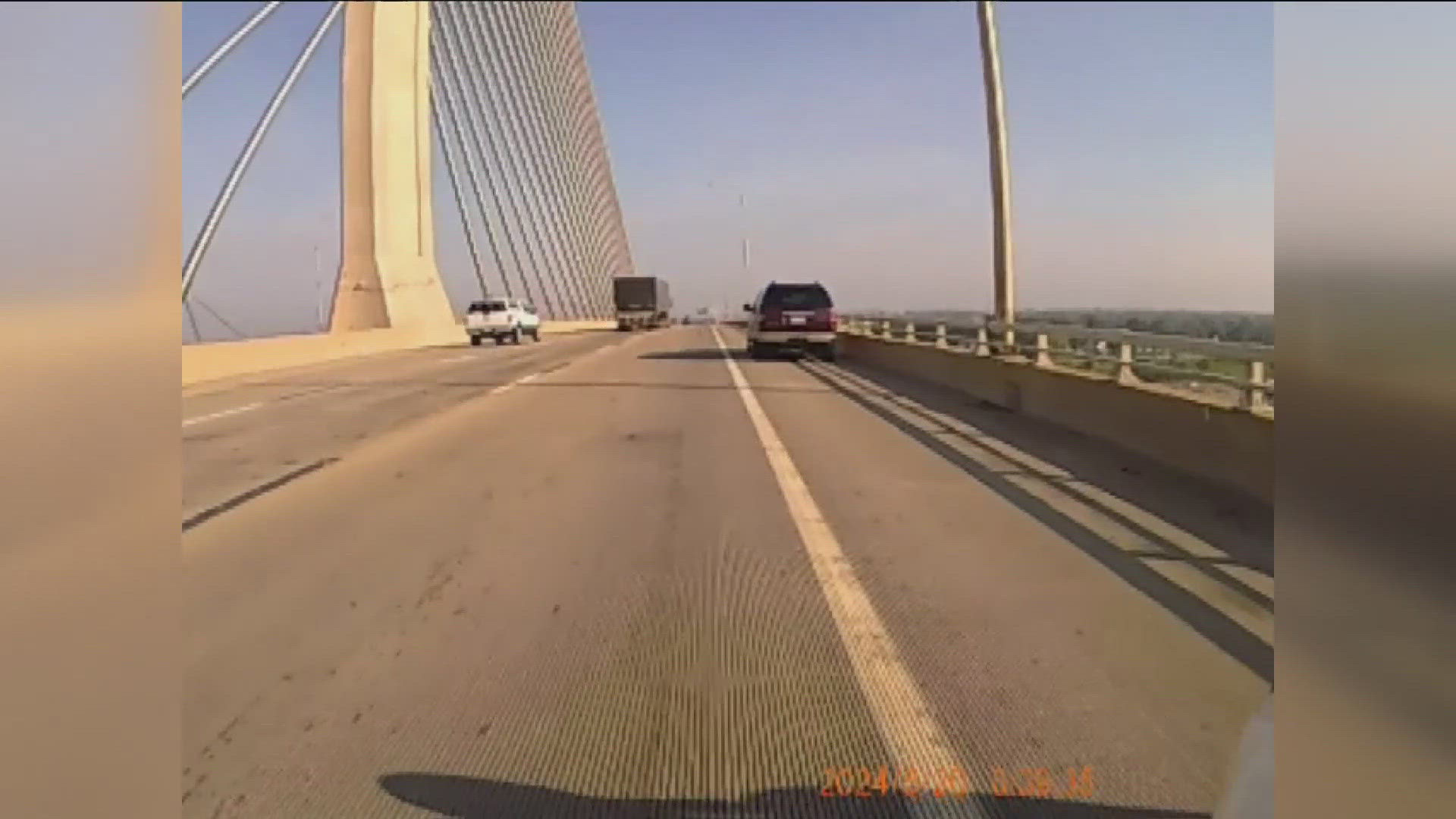TOLEDO, Ohio — Video released by Toledo police shows officers on Monday using de-escalation tactics on the Veteran's Glass City Skyway Bridge to prevent a person from potentially taking their own life and seeking treatment instead.
The video, shows two officers responding to a suicide risk call on the bridge. In the video, they walk up to a vehicle parked in the curb lane on the bridge and see a person smoking a cigarette inside the vehicle.
"I can't live like this," the person tells the officers.
"Well, the first step is to let us help you by letting us get you to talk to someone. Help you deal with whatever is going on with your life," says officer Ryan Spann.
Only minutes before, the officers had been dispatched to the bridge after passersby saw the person walking near the edge, leading people to tell Toledo police the person may be at risk of suicide.
Once the officers actually approach the vehicle, the person is noticeably distressed and can be heard in the video repeatedly telling the officers he is "trying to get right."
Lt. Paul Davis, spokesperson for the Toledo Police Department said in these kinds of scenarios, the best thing for officers to do is strike up a conversation.
"Trying to get some dialogue going, find out what's actually going on with that person, get them to start talking to us and tell them we have other options available other than what they're thinking of doing right there," Davis said.
Davis' points are exactly the kind of de-escalation tactics shown in the body cam video. The officers don't raise their voices or try to pull the person out of the car; they politely ask for the keys to the vehicle and have a conversation.
The officers try to get the person to open up and remind them of who they have in their life.
But de-escalation takes time and the person is still in the midst of a mental health crisis.
"Come on out with us," Spann says in the video. "We'll give you a ride to the hospital and we can talk to people. I'm telling you, they'll help you,"
"I've already been to the hospital," the person says.
"Well, sitting up here isn't your best option," Spann says.
'I wasn't trying to sit up here," the person responds.
The officers remained patient and, finally, the person gave in and accepted a ride to seek treatment.
Davis said successful de-escalation attempts are why the department emphasizes the tactics to officers during training, in the field and beyond, because at the end of the day, they want everyone to be able to go home.
"If we can slow the situation down, and have the opportunity to have a peaceful resolution, we're going to try to do that," he said.
Davis said TPD is connecting officers to a 40-hour class on de-escalation tactics being offered by the Toledo-Lucas County Health Board.
TPD's goal is for every officer to be trained on it as soon as possible, he said.
___
The National 988 Suicide & Crisis Lifeline provides free and confidential support for anyone in distress and resources for anyone who may need help. By dialing 988, you can be connected with a local crisis center 24/7 for help. You can also chat online at 988lifeline.org.
The Lucas County Emotional Support Line is available at 419-442-0580 from 8 a.m. to midnight and offers peer support.
If you want to talk to someone and are not in immediate danger, Text "HOME" to 741741 to be connected to the Crisis Text Line and a trained counselor. There is no charge and the information will not show up on your phone bill. You can also chat online at www.crisistextline.org.
If you are a young member of the LGBTQ+ community and need help in any way, call the Trevor Project at 1-866-488-7386. Calls made to the Trevor Project are free and kept confidential.
Emergency Mental Health Support
The Lucas County CRISISCare line is available at 419-904-2273 to connect with a local, trained crisis counselor to discuss a mental health emergency 24/7.
The Wood County Crisis Line offers immediate assistance by calling 419-502-4673.
If a situation involves immediate danger to you or a loved one, NAMI Greater Toledo says calling 911 and talking with police may be necessary. It is important to tell 911 that it is a psychiatric emergency and ask for police officers trained in crisis intervention.

